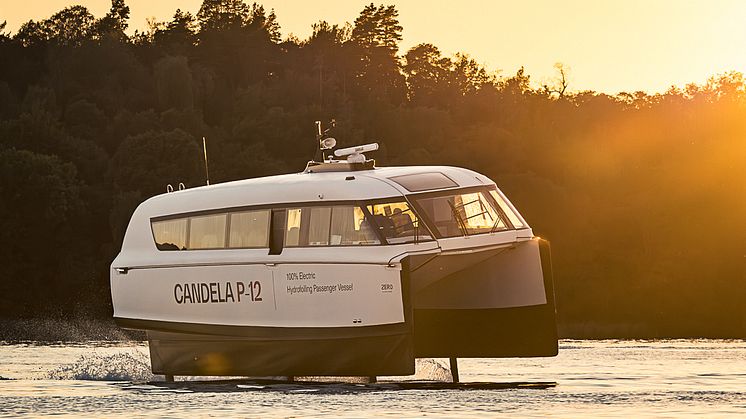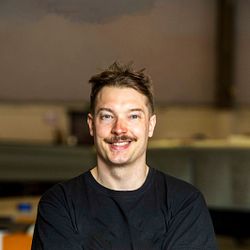
Press release -
Candela and DNV partner to get foiling P-12 on the water
Safety standards are typically designed with traditional ships in mind—not carbon fiber, computer-controlled electric vessels that fly above the water. That’s why Candela and DNV had to innovate to ensure the world’s first foiling electric ferry could hit the water while meeting the rigorous standards that ensure maritime safety.
Stockholm, June 4, 2025— Candela, the Swedish electric hydrofoil pioneer, has partnered with global assurance and risk management leader DNV on the groundbreaking Candela P-12 ferry. Using DNV’s rigorous Technology Qualification (TQ) process, Candela has systematically assessed and mitigated risks associated with its novel technology, resulting in vessels ready for commercial operation.
As the first electric hydrofoil ferry in serial production, the P-12 introduces several technological firsts - such as real-time foil control systems, computer-stabilized flight, and ultra-light carbon fiber construction - that are not fully covered by traditional maritime standards. DNV’s TQ framework was critical in providing a path toward regulatory approval.
“Our goal was not just to comply with safety regulations, but to redefine them,” says Niklas Nordin, Candela’s Chief Product Officer. “The TQ process gave us the structure to identify potential hazards early and implement safety mechanisms that go beyond the required minimums.”
The Candela P-12 flies above the water on computer-guided hydrofoils, reducing drag and energy use by 80% - enabling high-speed, long-range travel on battery power alone. But while flying, the vessel depends on real-time software control to remain airborne.
“That was one of the scenarios we tested through the TQ process - unplugging the flight computer mid-flight,” says Niklas Nordin. “We’ve built passive safety into the hydrofoil system, so that if the control is lost, water pressure automatically forces the foils into a neutral position, gently lowering the vessel back into the water. It worked exactly as intended.”
“With our DNV technology qualification process we leverage the knowledge and expertise of our subject matter experts, alongside our customers, to address the challenges and uncertainties in technology at the cutting edge of maritime transport,” Mikael Johansson, Senior Principal Consultant and Head of Maritime Advisorz for Sweden and Denmark. “We’ve enjoyed an excellent cooperation with Candela, they have taken advantage of the TQ process to not merely aim for compliance but build in more redundancy and safety functionality than required. The award of this statement is a fantastic achievement, and we look forward to continuing this collaboration.”
DNV’s structured methodology provided Candela with a full validation roadmap, from early design to sea trials. The result: a state-of-the-art electric ferry that combines bold innovation with proven safety - a vessel now operating in Stockholm’s public transport network and ready for global deployment.
Stockholm-based Candela Technology AB is the world leader in hydrofoiling electric vessels. The company was founded in 2014 by engineer and business leader Gustav Hasselskog with the mission to accelerate the world's transition to fossil fuel-free lakes and oceans by developing electric vessels that outperform those powered by fossil fuels.
Candela's watercraft have wings (hydrofoils) that lift the hull above the water and reduce friction, using 80% less energy than conventional ships at high speed. This technology allows for long-range water travel solely on battery power, a first in the industry. Candela's hydrofoils also enable operators to transition to sustainable fleets by providing up to 50% lower operational costs.
At the heart of Candela's hydrofoil tech stack is the Flight controller, which automatically stabilizes the vessel during flight by regulating the foils, using sensors that gauge wave height and wind speed, among other factors. Even in rough weather, passengers experience 90% less g-forces than they would on a traditional boat. All Candela vessels are fully connected and receive over-the-air updates.
After five years of research and development, Candela began producing the world's first electric hydrofoil leisure boat in 2019, the Candela C-7 open "roadster of the seas". This was followed in 2022 by the high-volume market Candela C-8, which was delivered to the first customers in spring 2023. Over 150 C-8 units have been sold to date, and the vessel has been lauded as a "game changer" by Motorboat and Yachting magazine, winning numerous awards including the 2022 European Powerboat of the Year award for its superior seakeeping, long range, and high speed.
In 2023, Candela launched its first commercial vessel, the Candela P-12 Shuttle ferry. It is the fastest and longest-range electric ship ever built, with a top speed of 30 knots and a range of 40 nautical miles at 25 knots. It is also the most energy-efficient fast ship ever made in its size class. Substantial operational cost savings are expected. The first unit enters service in Stockholm's public transport system in 2024.
Candela is a technology company with headquarters in Stockholm, Sweden, employing over 200 engineers, technicians, and production staff. The company develops the entire tech stack, from the C-POD motor to the control system and carbon fiber hulls, in-house. Candela's two wholly-owned factories in Stockholm, Sweden, produce the Candela C-8 and P-12 vessels. The company also has leisure boat resellers in 12 countries and wholly-owned sales offices in San Francisco, USA, and Cannes, France.

